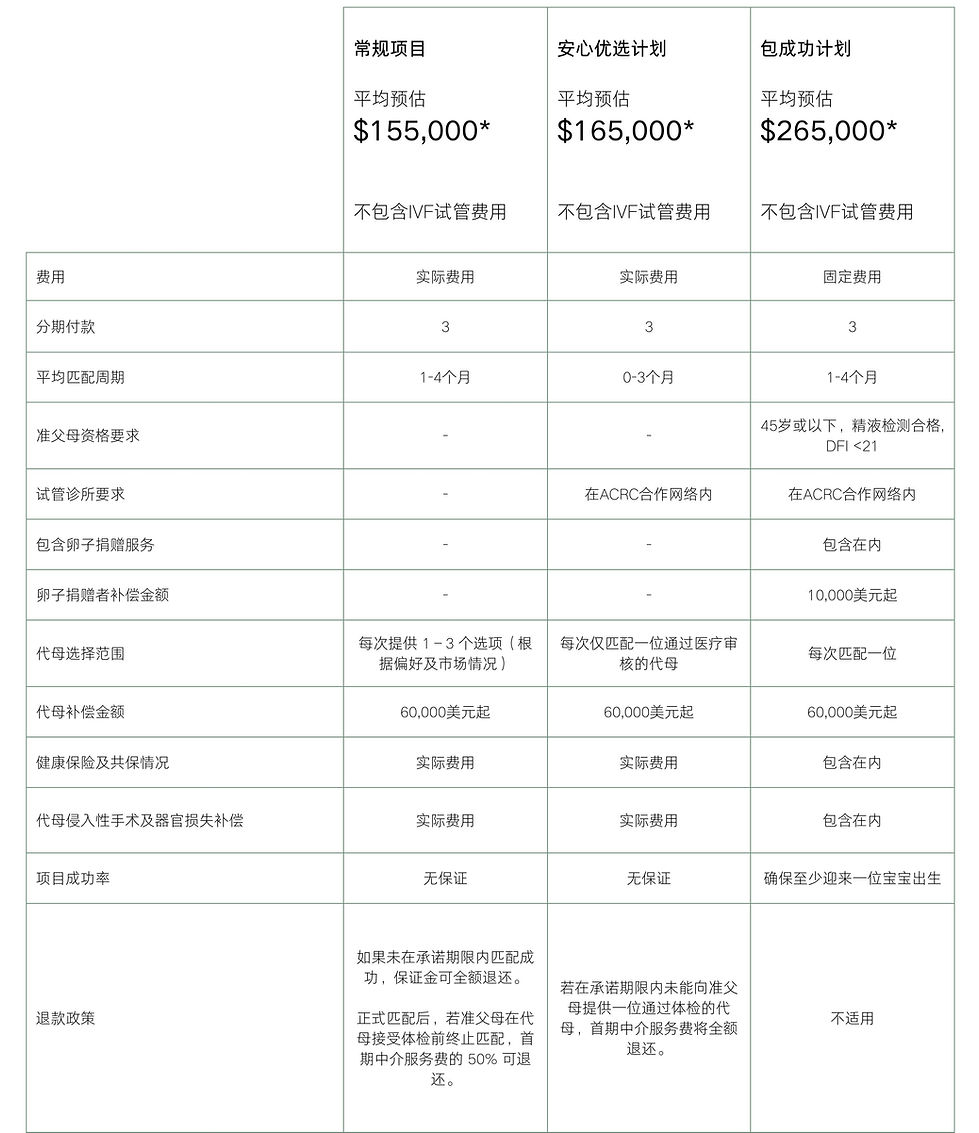
美国代孕
全面了解代孕费用,保护您的权益
在迈向家庭梦想的旅程中,了解代孕的费用结构是每一位准父母做出明智决策的关键。
代孕相关费用通常包括:
-
专家类费用,如代孕机构、心理医生、律师、信托公司、保险代理机构等相关费用
-
代母基本补偿金、福利及代孕相关的差旅、工资损失等
-
准父母法律亲权判决
-
保险及自负额费用
无论您是在加州、纽约,还是其他合法州寻求代孕服务。与ACRC Global合作,意味着您将获得全程透明、专业可靠的费用支持与服务指导。我们将协助您全面掌握财务规划,帮助您安心踏出每一步。
值得信赖的专业团队
为什么选择ACRC的美国代孕服务?
在 ACRC,您不仅获得完整、透明的费用指导,更有一对一的专属顾问协助,帮助您:
-
精准预估全程代孕开支
-
选择适合的代母人选
-
规避潜在隐形成本
借助我们经验丰富的团队与全球生殖医疗网络,您可以更自信、安心地迈向理想家庭。
代孕服务的专业费用构成
保险与共付费用
代孕是一个涉及多领域专家协作的复杂过程,费用包括但不限于:
-
代孕机构服务费
-
第三方信托账户管理费用
-
辅助生殖律师及法律文件费用
-
保险顾问与保险配置
这些费用确保整个流程合法、合规、安全,确保您可以安心的带宝宝回家,并体现出代孕项目的专业性和严谨性。
在代孕过程中,准父母须为代母购买:
-
意外险身故保险
-
器官丧失保险
-
医疗保险(覆盖产检、生产与产后3-6个月的复查)
特别说明:
-
医疗保险须是代孕友好保险
-
通常医疗保险只能在IVF诊所毕业后才能使用(怀孕约10周)
-
保险注册季为每年11月1日至次年1月15日(根据各州情况,部分州的注册季会延长)
-
纽约州法律要求代母保险至少覆盖产后12个月
-
非纽约州根据代母是否有并发症,覆盖产后3-6个月
我们将协助您选择合理的保险配置,降低意外风险。
法律费用:确立亲权
取得准父母亲权判决是代孕中非常重要的法律环节。根据不同州法律,亲权判决形式有:
-
产前判决(Pre-Birth Order)
-
产后判决 (Post-Birth Order )
-
产前加产后判决(Pre-Birth Order & Post-Birth Order)
ACRC与经验丰富的辅助生殖法律团队协作,确保取得宝宝亲权的合法权益。
一站式家庭构建平台
选择 ACRC成为您的美国代孕伙伴
我们不仅提供代孕匹配服务,还为您提供:
卵子/精子捐赠匹配
财务及法律第三方咨询
全流程协调与心理支持
让每一位准父母享有顺畅、透明、安心的一站式美国代孕体验。
严格的代母预审机制
ACRC 的代母招募团队将对每一位代母进行全面筛选:
-
刑事背景审查
-
财务状况与社交行为评估
-
居住环境审核
-
药物筛查及BMI审核
-
既往孕产及IVF病历审核(如有)
这一严谨流程确保代母人选健康、安全、值得信赖。
遵循 ASRM 标准
我们严格遵循**美国生殖医学会(ASRM)**的各项指导原则,确保每一位代母的筛选与每一次代孕流程:
-
合法
-
合规
-
符合伦理规范
这一国际标准的执行,保障了准父母与代母双方的共同权益与旅程安全。
全方位支持和关怀
ACRC 不仅关注代孕流程的顺利推进,更重视准父母和代母的身心健康
从代母匹配、孕期管理到法律协调:
-
提供一对一专属服务团队
-
建立温暖、安心的合作环境
-
全程协助,帮助每一段代孕旅程圆满完成
让您的生育旅程,不只是一次医疗过程,更是一段被全方位守护的温暖旅途。
如何选择代孕服务?
代孕服务费用预览
ACRC美国代孕费用透明公开,相关服务一站式报价
标准代孕计划
平均预期费用
$155,000*
不包含试管婴儿及新生儿相关费用
代孕服务
代母评估与支持
法律合同支持
托管与账单管理
(7天24小时账户登陆权限)
代母的相关费用
法律亲权判决
保险与自付额
代母补偿金从5万美元起
安心代孕计划
平均预期费用
$165,000*
不包含试管婴儿及新生儿相关费用
代孕服务 - 包含一位已通过体检代母
代母评估与支持
法律合同支持
托管与账单管理
(7天24小时账户登陆权限)
代母的相关费用
法律亲权判决
保险与自付额
代母补偿金从6万美元起
包成功代孕计划
起始固定费用
$265,000*
不包含试管婴儿及新生儿相关费用
代孕服务 + 捐卵服务
代母评估与支持
法律合同支持
托管与账单管理
(7天24小时账户登陆权限)
捐卵女生相关费用
代母的相关费用
法律亲权判决
保险与自付额
捐卵女生补偿金
(起价1万美元)
代母补偿金
(起价6万美元)
固定费用服务,确保准父母无临时额外支出
无限次胚胎移植
保障一个宝宝出生
预期费用 & 实际开销
预期费用 & 实际开销
固定费用套餐
%20(1).jpg)
最终费用细节会根据每准父母的情况有所不同,请预约咨询获取预算
ACRC蓝宝石计划 - VIP代孕服务
蓝宝石计划是为VIP准父母量身定制的高端服务计划,是代孕计划的升级服务。宗旨既让准父母体验到定制化,个性化专属管家式服务,提供无以伦比的尊享奢华体验。







